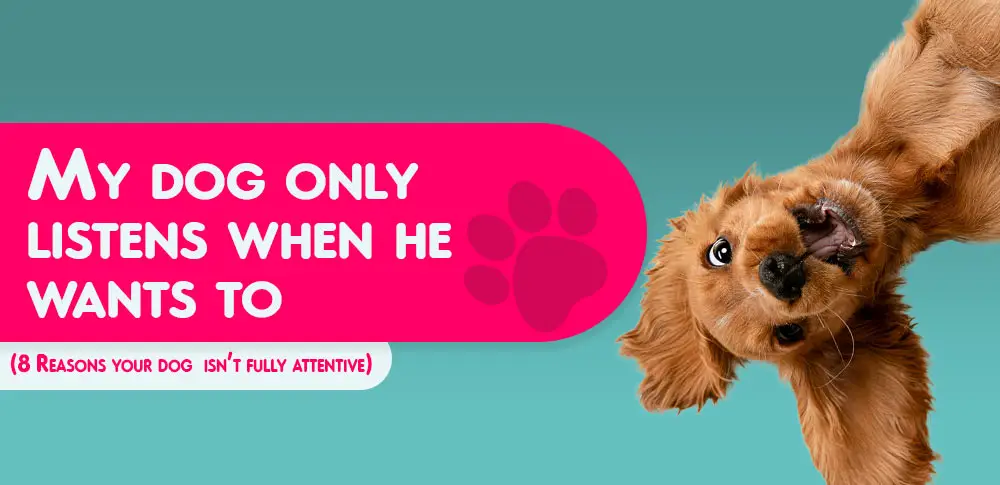Do you ever feel your dog only listens to you when he wants to? If you’re a dog parent struggling with this, then you already know you know how aggravating it is when Fido only listens to you when he pleases.
I mean, you put in a lot of time and effort teaching him new commands and encouraging positive behavior, yet he chooses to sit on cue when he feels like or stop barking at the neighbor’s cat on his own terms.
It’s like being rejected on a human level, leaving you frustrated and confused about why your dog won’t listen to you.
The good news is that you are not alone!
Suggested reading: Why does my dog listen to everyone but me (new tab)
Many dog owners struggle with this problem, and there are several reasons why your dog may only listen to you on his own terms such as lack of consistency, less motivation, distractions, etc.
In this article, we’ll explore many reasons why your dog acts this way and how to address it and build a stronger relationship with your furry friend.
Why does my dog only listen when he wants?
Being inconsistent
Inconsistency in training is a leading cause of dogs obeying their owners exclusively on their own terms.
Those who have seen a dog being taught know that repetition is crucial. When teaching a dog, particularly a small puppy, a new trick or command, consistency is key.
It’s important to be consistent in your verbal and nonverbal communication of directives, praise, or reprimand. Although this method might be time-consuming, the end product is well worth the effort.
Your dog should understand exactly what you mean when you say “sit.”
Your dog will be confused if you tell him to “sit” one day, “go down” the next, and “sit down” the third.
This inconsistency can lead to confusion, anxiety, and frustration, causing him to only listen to you when he feels like it.
Avoid this problem by being consistent with your directions and always following through. Because your dog won’t pick up every new command right away, it will help if you keep repeating them with patience and understanding.
Distractions
Your dog getting distracted may be just another reason why he listens to you when he wants to. Dogs are notorious for their curiosity and this can be seen when they readily want to explore their environment and everything around them.
When a dog is distracted, it means that their attention is focused on something else, and they are not fully aware of their surroundings. This can create a challenge for dog owners who are trying to train their dogs or communicate important information to them.
For example, imagine walking your dog and a car suddenly honks, this immediately draws your dog’s attention and he may easily not pick up on the sound of your command when you give them.
Similarly, if a dog is fixated on a particular object, like a toy, they may not respond to basic commands like “sit” or “stay.”
Lack of motivation
Your dog’s lack of drive might be another factor in his selective obedience. Dogs will most times choose to listen to you at will if there’s a lack of motivation.
Treats, toys, and praise are all great ways to motivate dogs. Provide enough incentives for your dog to obey your commands.

For instance, if you want to train your dog to come when called, you should do it with the help of his favorite treat.
This lets him understand that he doesn’t only get to do something interesting, but also gets rewarded in the process.
However, you should be a little cautious as to how you use this as it can ultimately backfire leaving you with a dog that only listens when there’s a reward.
Failure to establish yourself as the pack leader
Dogs are pack animals which means they have a natural tendency to see their family as a pack, with each individual contributing to the overall function of the pack.
In the perspective of your dog, the pack has an alpha member or leader who is responsible for directing everything that is going on.
Establishing yourself as the leader of the pack is necessary if you want your dog to listen to you when you want him to.
Fido isn’t getting enough exercise
Exercising allows dogs to burn off pent up energy. In situations where your dog isn’t getting enough exercise, this may lead to frustration.
It’s possible that if you don’t give your dog enough exercise he’ll start being antsy and distracted.
Because of this, it may be difficult for him to pay attention to the orders that you provide, which may result in him only listening to you when he chooses to do so.
Separation anxiety
Many dogs suffer from separation anxiety, which may show itself in a variety of ways, including excessive barking, destructive behavior, or disregarding orders.
It’s possible that if your dog suffers from separation anxiety, you’ll only have his attention when he’s in the same room as you and only when he’s in the mood to pay attention to you.
If your dog suffers from separation anxiety, one strategy for treating the condition is to gradually introduce him to the idea of being left alone for little periods of time.
Your dog will understand that being left alone is not always a negative experience and that you will definitely return.
Another option is to have a comfortable crate or bed that your dog can retreat to when you’re not around.
You can leave some toys, a blanket, or a t-shirt that smells like you in this space. This adds an extra layer of comfort and security, and significantly helps reduce anxiety.
He is scared
There’s only so much negative impact a fearful relationship with your dog can cause.
Yelling commands or being harsh on your dog can cause him to become scared of you, hence, he will obey your command due to this fear.
Consequently, when he feels there’s no need to be scared of you, he may only obey your commands when he chooses and if he chooses.
Your dog doesn’t trust you
If your dog does not trust you, he may not pay attention to the orders you give him. In any connection, including the one you have with your dog, trust is the most important component.
If your dog does not trust you, he may have feelings of insecurity or uncertainty about your intentions, which will make it difficult for him to obey the directions you give him.
How to make your dog listen every time

Be consistent
Dogs thrive in situations where they have a set schedule and can anticipate what will happen next; thus, it is essential to be consistent with the directions and commands you give them. Ensure that you use this exact command when referring to a certain action you want your dog to obey.
Eliminate distractions
Distractions can be a factor that affects your dog’s ability to listen to you when you want them.
If your dog is easily distracted, you should aim to limit the number of things that might divert their attention. Teach them in a calm setting with few distractions at first, then gradually increase the number of things going on around them.
Be clear and concise
To get the optimum response from your dog, your orders should be straightforward and brief. For instance, make use of one- or two-word instructions like “sit,” “stay,” and “come.” Always remember to speak in a strong and confident tone with dealing commands.
Be the leader of the Pack!
One of the ways in which you may position yourself as the leader of the pack is to ensure that you offer guidance in the daily routine of your dog.
It is important to create a routine throughout all of your dog’s interactions, including feeding time, play time, going for walks, and as well as other activities.
This framework helps build consistency, which enhances the bond you have with your dog. This way, he knows that you govern the pack and feels comfortable and confident as a result of this knowledge, hence, he will listen to you more.
Recap on why your dog only listens when he wants to
Training your dog is a process that requires patience, consistency, and understanding. The reasons why your dog may only listen to you when he wants to can be multifaceted, but understanding the root causes of this behavior can help you take appropriate measures to overcome it.



